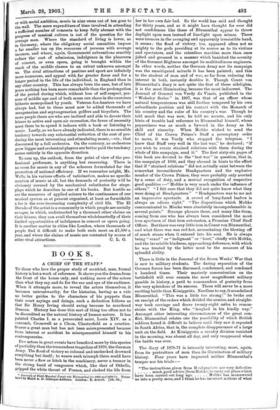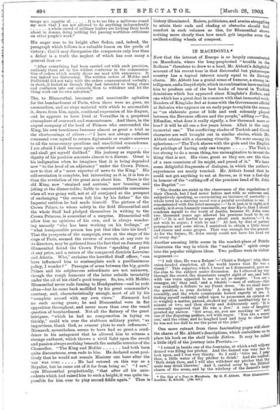BOOKS.
A CHIEF OF THE STAFF.*
To those who love the proper study of mankind, man, formal history is but a work of reference. It shows you the drama from the front of the house only, and nothing more of the actors than what they say and do for the ear and eye of the audience. When it attempts more, to reveal the actors themselves, it becomes . untrustworthy, for the historian, having as a rule no better guides to the characters of his puppets than their overt sayings and doings, such a deduction follows as that Sir Henry Irving should swing because he murdered Duncan. History-has done-this sort of thing too often not.to be discredited as the natural historyof human nature. It has painted Charles I. as a persecuted- saint, Louis XIV. as a coxcomb, Cromwell as a Cleon, Chesterfield as a courtier. Scarce a great man but has not been misrepresented because from interest or accident he misrepresented himself to his contemporaries. •
Few actors in great events have benefited more by this species of partiality than the tremendous tragedian of 1870, the German Army.. The flood of victory so Colossal and unchecked drowned everything but itself ; to weave such triumph there could have. been never a flaw or hitch in the machinery; never a tremor in the strong hand of vengeance which, like that of Othello, gripped the white throat of France, and -choked the life from
Journals of Pteld.Nar hal dou. vat Blan *utile for 1888 and 18'70.71. Trans- lated by Major A. D. Gillespie-Addison. Lionabn: E. Arnold. [12e. dd.]
her in her own fair bed. So the world has said and thought for thirty years, and so it might have thought for ever did not confidences like these of Blumenthal appear to throw daylight upon men instead of limelight upon mimes. There were tremors in the avenging and apparently irresistible hand, it seems ; the flood of victory, too, appeared often not so mighty to the gods presiding at its source as to its victims and spectators, and the relentless machine more than once jolted and groaned in a manner which banished the serenity of the Serenest Highness amongst its multitudinous engineers.
In other words, neither the German Army nor its campaign was the unmitigated miracle it has been painted; and this to the student of man and of war, so far from reducing the interest in both, instantly doubles it. Though Count von Blumenthal's diary is not quite the first of these sidelights, it is the most illuminating, because the most indiscreet. The Journal of General von Verdy du Vinois, published in the " Wolseley Series " in 1897, was that of an officer whose natural temperateness was still further tempered by his own subordinate position and his contact with the Monarch of his country and the ruler of his country's war. Though he told much that was new, he told no secrets, and his only hints of trouble had reference to Blumenthal himself, whose pepperiness was as much a byword in the Army as his skill and sincerity. When Moltke wished to send the Chief of the Crown Prince's Staff a peremptory order to move, it was Verdy who stopped the telegram. " I knew that Staff very well in the last war," he declared ; "if you wish to create strained relations with them during the whole of this campaign, send it." The first sixty-six pages Of this book are devoted to the "last war" in question, that is, the campaign of 1866, and they abound in hints to'the effect that if " strained relations " did not actually exist between the somewhat inconsiderate Headquarters and the explosive mentor of the Crown Prince, they were probably only averted by a sense of duty, and a mutual recognition of respective good qualities :—" Moltke is very much under the influence of others." " I felt sure that they did not quite know what they were doing at Headquarters." " Headquarters was to me not an impressive spectacle. A crowd of long-faced loafers is always an odious sight." " The dispositions which' Moltke communicated to Miscke were absolutely incomprehensible in several points." Strange phrases these, and many like them, coming from one who has always been considered the most iron specimen of that iron automaton, a Prussian Chief 'Staff Officer. Butthere was very little iron in Count von Blumenthal, and what there was was red-hot, necessitating the blowing off of much steam when it entered into his soul. He is always being " vexed " or " indignant " or " hurt," chiefly with Moltke, and the invariable kindness, approaching deference, with which he was treated by the latter must be the measure of his splendid ability.
There is little in the Journal of the Seven Weeks War that is new to military students. The daring separation of the German forces has been discussed, condemned, and condoned a hundred times. Their masterly concentration on the battlefield will ever remain the most magnificent military gamble in history, a peril to commanders of posterity from the very splendour of its success. There will never be a more exciting battle than Koniggratz. Needless to say, it scandalised Blumenthal. " This was a little too strong !" he broke out on receipt of the orders which divided the armies, and straight- way took carriage and drove twenty-eight miles to remon- strate with the Xing, who " laughed in his kindly way."
Amongst other interesting circumstances of the great con- flict, Blumenthal relates one the possibility of which British soldiers found it difficult to believe until they saw it repeated in South Africa, that is, the complete disappearance of a large unit on the field. At Koniggratz a cavalry division vanished in the morning, was absent all day, and only reappeared when the battle was over.
The diary of 1870-71 is intensely interesting, more, again, from its portraiture of men than its illumination of military history. Four years have improved neither Blumenthal's temper nor his trials :—
"The instructions given from Ikadinarbra are very defective
much good advice [fromMoltke] to carry oat plans which have been carried out long ago Moltke has mancenvred us into a pretty mess, and I think he has incorrect notions- of what troops are capable of. . . . . . It is to me like a millstone round my neck thit I am not allowed to do anything independently a whole crowd of military loafers are kicking their heels about in dozens, doing nothing but passing worthless criticisms on other people's work."
His anger rose to its height after Sedan, and, indeed, the paragraph which follows is a valuable lesson on the perils of victory; that it may disorganise the conquerors only less than a defeat is a truth the neglect of which has cost many a general dear :—
" After everything had been carried out with such precision, suddenly there set in the wildest confusion in the communica- tion of orders which nearly drove me mad with annoyance. It was indeed too distressing. The written orders of Moltke and Podbielski did not tally with the orders communicated verbally ; in short, it looked as though they had intended to bring chaos and confusion into our counsels, then to withdraw and let the thing work out its own salvation."
The, to Blumenthal, insensate and unscientific agitation for the bombardment of Paris, when there were no guns, no ammunition, and no siege material with which to accomplish it, draws from him, again, continual expression of his disgust, and he appears to have lived at Versailles in a perpetual atmosphere of overwork and remonstrance. And there, in the august company of the herd of Princes who surrounded the King, his own touchiness becomes almost as great a trial as the shortcomings of others :—" I have not always sufficient command over myself to return diplomatic or evasive answers to all the unnecessary questions and unsolicited conundrums I am afraid I shall become again somewhat caustic
and shall get myself disliked." His jealousy as regards the dignity of his position amounts almost to a disease. Great is his indignation when he imagines that it is being degraded now "to the level of an adjutancy" under the Crown Prince, now to that of a " mere reporter of news to the King." His
self-revelation is complete, but interesting as it is, it is less so than the revelation of the great men about him. There is the old King, now " strained and anxious," now beaming and joking at the dinner-table; liable to unaccountable uneasiness when all was going well, not at all overjoyed at the prospect of exchanging "the crown left him by his father" for the Imperial emblem he had made himself. The picture of the Crown Prince, to whose safety in the field Blumenthal and the whole Staff had pledged themselves in writing to the Crown Princess, is somewhat of a surprise. Blumenthal will allow him no opinions of his own, and is always wonder- ing uneasily "who has been working on his feelings," or " what irresponsible person has put that idea into his head." That the prospects of the campaign, even at the stage of the siege of Paris, seemed the reverse of roseate, at any rate to its directors, may be gathered from the fact that on January 9th Blumenthal found the Crown Prince " speaking of peace at any price, and a return of the conquered districts Lorraine and Alsatia. Who," exclaims the horrified Staff officer, " can have influenced him to contemplate such a pusillanimous policy, I wonder ? " Passages of arms between the big, gentle Prince and his sulphurous subordinate are not unknown, though the rough humours of the latter subside invariably under the oil of his chief's good temper. So, too, with Moltke. Blumenthal never rode fuming to Headquarters—and he rode often—but he came back mollified by his great commander's courtesy, and, characteristically enough, most of all by his "complete accord with my own views." Bismarck had no such saving grace ; he and Blumenthal were in flat opposition throughout, and never more than over the vexed question of bombardment. Not all the flattery of the great intriguer, "which he had no compunction in laying on thickly," could win over the stubborn military purist, "as impervious, thank God, as armour plate to such influences." Bismarck, nevertheless, seems to have had so great a confi- dence in his antagonist that he allowed him to witness a strange outburst, which throws a vivid light upon the revolt and passion always seething beneath the metallic exterior of the Chancellor. " The King and Moltke had both been quite discourteous, even rude to him. He declared most posi- tively that he would not remain Minister one hour after the war was over He had entered on this war as a Royalist, but he came out of it far from being so." " I saw," says Blumenthal prophetically, "that after all his ante- cedents which had raised him to such a height, it was quite im- possible for him ever to play second fiddle again." Thus is history illuminated. Rulers, politicians, and armies struggling to attain their ends and chafing at obstacles should find comfort in such volumes as this, for Blumenthal shows nothing more clearly than how much grit impedes even the swiftest-rolling wheels of conquest.











































 Previous page
Previous page